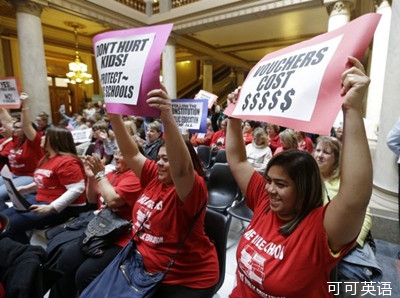MARGARET WARNER:Now the debate over vouchers and school choice is heating up anew in some states -- the latest, last week, the Indiana Supreme Court upheld a 2011 state law allowing tax funds to be used for private schools through tuition vouchers.
We turn again to Hari for that story.

HARI SREENIVASAN:Ahead of last week's ruling, Republican Gov. Mike Pence rallied students and parents at the state legislature in Indianapolis in support of the voucher program.
In 2011, education correspondent John Tulenko visited Indiana soon after the law passed and found passions still strong on both sides. Then-state Superintendent Tony Bennett was the driving force behind the Republican-led choice movement.
TONY BENNETT, Former Indiana State Superintendent: What this has done, it has allowed—and the statistics are bearing it—it is allowing families the opportunity to pursue prosperity for their children.
HARI SREENIVASAN:Democratic State Representative Ed DeLaney said he preferred high-quality public schools over choice.
STATE REP. EDWARD DELANEY, D- Ind.: This is not a scientific experiment. It's an attempt in my view to just push down public education.
HARI SREENIVASAN:Indiana is one of more than 15 states that allows public funds to be used for private education. There are several types of choice programs, including vouchers, scholarship tax credits, and in Arizona, where the state provides education savings accounts allowing public money to be used for tuition, supplies and books.
While most programs target the poor and those who live in districts with failing schools, Indiana's is far more expansive, opened to households with incomes of up to $64,000 dollars a year for a family of four.
In 2002, the U.S. Supreme Court ruled that providing school vouchers, which can be used at religious schools, doesn't violate the separation of church and state, leaving individual states to decide. Some state courts have overturned school choice programs like vouchers, while others, such as Indiana's have upheld them.
Next year in Indiana, more than half of the students will be eligible for vouchers worth up to $4,500 dollars per child.
For more on the fallout from the Indiana case and the broader national outlook, we turn to two leading voices on opposing sides. Kevin Chavous is executive counsel for and a founding member of American Federation for Children, a group promoting vouchers and school choice. And Dennis Van Roekel is the president of the National Education Association, the largest labor union. It represents more than three million public school employees, most of them teachers.
Thanks for joining us.
Kevin, I want to start with you.
How concerned are you about this Indiana case? What are the broader implications?
KEVIN CHAVOUS, American Federation for Children: Well, the broader implications are clear, Hari.
People really want change. You really need to go back to "A Nation at Risk." This is the 30th anniversary of that landmark federal report in which it said that we were running a major risk in terms of not being able to educate all of our children. The educational outcomes, if a unilateral force had done this outside of this country, it would be declared an act of war.
Well, things have gotten worse. And the bottom line is people and parents are clamoring for change. And that's why you see that these scholarship programs, these voucher programs, tax credits, they're emerging all over the country, because people don't want to be consigned to a bad school based on zip code.
And this really isn't about partisan politics. It really is about making sure that parents have as many quality options as possible available to educate their children.
HARI SREENIVASAN:Dennis Van Roekel, do you think this is possibly a tipping point, that this will refocus or reframe the conversation?
DENNIS VAN ROEKEL, President, National Education Association: Well, the legal implications for Indiana don't go beyond the borders because it simply applies in Indiana.
I do think it will increase the conversation. And I don't think that's bad. I think it's important that we talk about the students in America that are not getting the education they so richly deserve. But I think what we have to do is to stay focused. We need to stay focused on the right of every child to have a good public education. And for those who oppose vouchers, what we believe is that you do not use—pay private school tuition at taxpayer expense.
Instead, we ought to do what we know works. Take schools and invest in early childhood. Increase parental involvement, small class size, especially in high-poverty schools at the lower grades. Make sure that we have a well-trained, qualified and certified work force that is stable.
When we do that, children succeed. But we do not believe it is a solution to take the few out and leave the rest behind.













